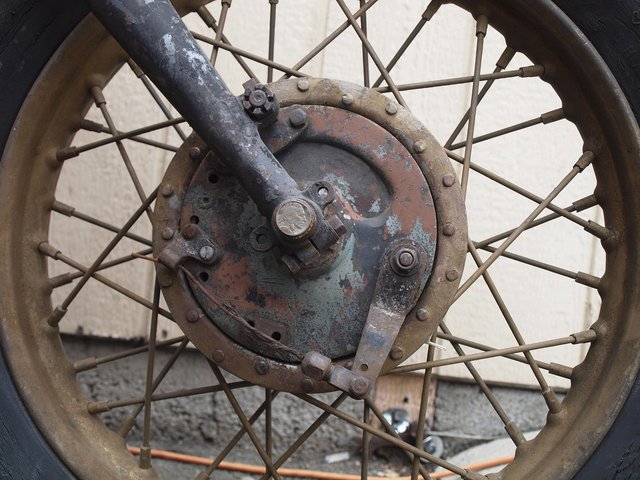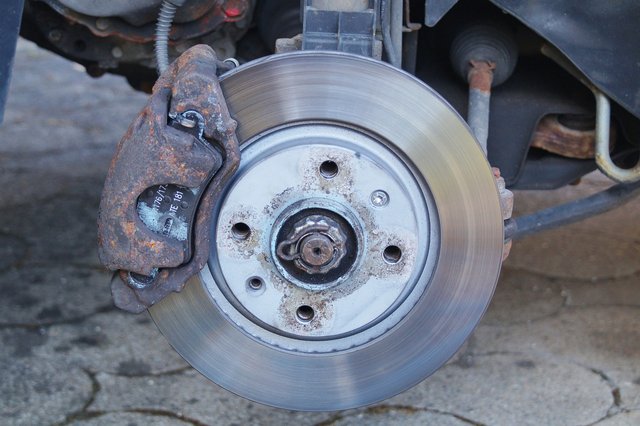Both drum brakes and disc brakes can be designed to meet safety standards, and their safety performance depends on various factors, including the specific design, the vehicle's application, and the conditions under which it operates. However, disc brakes are generally considered to offer certain safety advantages over drum brakes in certain situations. Here are some factors to consider:
Advantages of Disc Brakes:

picture from https://pixabay.com/photos/motorcycle-front-wheel-tire-553350/
Better Heat Dissipation: Disc brakes are more effective at dissipating heat compared to drum brakes. This is especially important in heavy-duty or high-performance applications where heat buildup can affect braking performance. Better heat dissipation helps prevent brake fade, maintaining consistent braking performance.
Shorter Stopping Distances: Disc brakes typically provide shorter stopping distances compared to drum brakes. This can be crucial in emergency braking situations where every inch counts.
Resistance to Brake Fade: Disc brakes are less prone to brake fade, which is a gradual loss of braking power due to overheating. This is particularly important in situations where brakes are subjected to repeated or sustained heavy use, such as descending steep hills.
Easier Inspection: Disc brakes are often easier to visually inspect than drum brakes. This can contribute to early detection of potential issues, improving overall safety.
Advantages of Drum Brakes:

picture from https://pixabay.com/photos/brake-disc-brake-caliper-2291881/
Parking Brake Functionality: In many vehicles, especially older ones, drum brakes are integrated into the parking brake system. When the parking brake is engaged, the brake shoes inside the drum provide the holding force. Some disc brake systems use a separate mechanism for the parking brake.
Cost: Drum brake systems are generally less expensive to manufacture, which can contribute to lower overall vehicle costs.
Considerations:
Vehicle Design: The safety of a braking system depends not only on drum vs. disc but also on the overall design and engineering of the braking system, including factors like brake balance, anti-lock braking systems (ABS), and electronic brake-force distribution (EBD).
Maintenance: Proper maintenance of either braking system is essential for safety. Regular inspections, brake fluid checks, and timely replacement of worn components are critical.
Driving Conditions: The safety of the braking system is influenced by driving conditions. For example, in everyday city driving, both drum and disc brakes can perform adequately. However, in high-performance or heavy-duty applications, disc brakes may have safety advantages.
In modern vehicles, disc brakes are commonly used on the front wheels, and drum brakes may be used on the rear wheels. The combination of disc and drum brakes is often designed to provide effective and balanced braking performance. Always follow the manufacturer's recommendations for brake maintenance and replacement to ensure optimal safety.
Drum brakes and disc brakes are two common types of braking systems used in vehicles, each with its own set of characteristics and advantages. Here are the key differences between drum brakes and disc brakes:
1. Design:
- Drum Brakes: Drum brakes have a drum-shaped housing that contains brake shoes and other components. When the brake pedal is pressed, the brake shoes are pushed outward against the drum to create friction and slow down the vehicle.
- Disc Brakes: Disc brakes consist of a rotor (disc) attached to the wheel, and calipers that contain brake pads. When the brake pedal is pressed, the calipers squeeze the brake pads against the rotor, generating friction to slow down or stop the vehicle.
2. Heat Dissipation:
- Drum Brakes: Drum brakes are generally less effective at dissipating heat compared to disc brakes. As heat builds up during braking, drum brakes may experience performance degradation, particularly in heavy or repeated braking situations.
- Disc Brakes: Disc brakes are more efficient at dissipating heat due to the exposed design of the rotor. This makes disc brakes more suitable for high-performance and heavy-duty applications.
3. Performance:
- Drum Brakes: Drum brakes are often considered less efficient in terms of stopping power and can be prone to brake fade under heavy use.
- Disc Brakes: Disc brakes provide better stopping power and are less prone to fade, making them more suitable for high-performance and demanding applications.
4. Maintenance:
- Drum Brakes: Drum brakes can be more complex to service and maintain. Adjusting the brake shoes may be required periodically to ensure proper performance.
- Disc Brakes: Disc brakes are generally easier to maintain. Brake pad replacement is a common maintenance task, and disc brakes are often easier to inspect.
5. Weight:
- Drum Brakes: Drum brake systems tend to be heavier than disc brake systems.
- Disc Brakes: Disc brake systems are usually lighter, contributing to overall weight savings in a vehicle.
6. Cost:
- Drum Brakes: Drum brake systems are often less expensive to manufacture and may be found in more budget-friendly vehicles.
- Disc Brakes: Disc brake systems can be more expensive to produce, and they are commonly found in higher-end or performance-oriented vehicles.
7. Space Requirements:
- Drum Brakes: Drum brakes can be more compact and are often used in the rear wheels of vehicles.
- Disc Brakes: Disc brakes require more space and are often used in the front wheels, although they are becoming more common in rear-wheel applications as well.
In summary, while both drum brakes and disc brakes serve the same fundamental purpose of slowing down or stopping a vehicle, they have distinct designs, performance characteristics, and maintenance requirements that make each suitable for different applications and vehicle types.
Thank you, friend!


I'm @steem.history, who is steem witness.
Thank you for witnessvoting for me.
please click it!
(Go to https://steemit.com/~witnesses and type fbslo at the bottom of the page)
The weight is reduced because of the lack of Voting Power. If you vote for me as a witness, you can get my little vote.
Downvoting a post can decrease pending rewards and make it less visible. Common reasons:
Submit
Upvoted! Thank you for supporting witness @jswit.
Downvoting a post can decrease pending rewards and make it less visible. Common reasons:
Submit